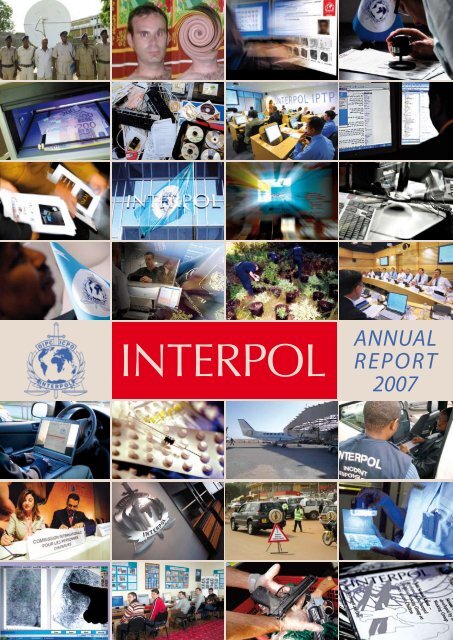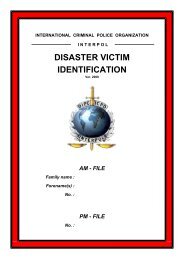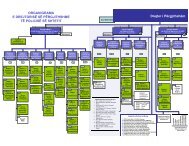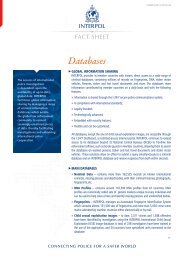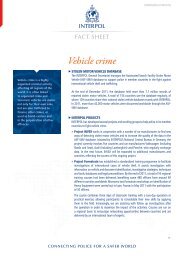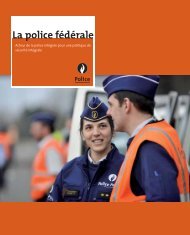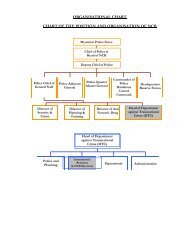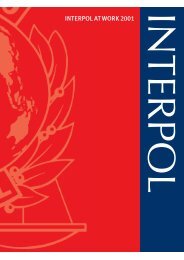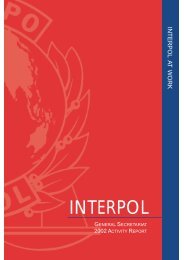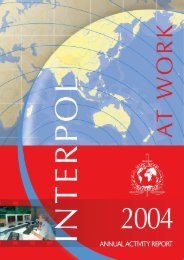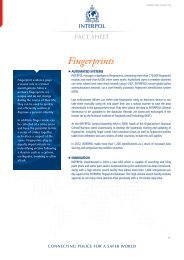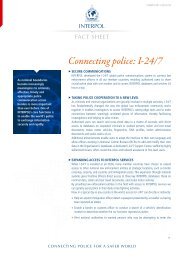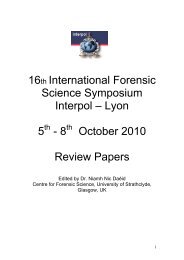File : 2007 - Interpol
File : 2007 - Interpol
File : 2007 - Interpol
You also want an ePaper? Increase the reach of your titles
YUMPU automatically turns print PDFs into web optimized ePapers that Google loves.
INTERPOL<br />
Annual<br />
report<br />
<strong>2007</strong>
About INTERPOL<br />
Created in 1923, INTERPOL is the world’s largest international police<br />
organization. Its mission is to assist law enforcement agencies in its<br />
186 member countries to combat all forms of transnational crime.<br />
INTERPOL provides a high-tech infrastructure of technical and operational<br />
support to enable police forces around the world to meet the growing<br />
challenges of crime in the 21st century. The Organization focuses on six<br />
priority crime areas: corruption; drugs and organized crime; financial and<br />
high-tech crime; fugitives; public safety and terrorism; and trafficking in<br />
human beings.<br />
The General Secretariat is located in Lyon, France, and operates 24 hours a<br />
day, 365 days a year. INTERPOL also has six regional offices across the world<br />
and a representative office at the United Nations in New York. Each of the<br />
member countries maintains a National Central Bureau staffed by highly<br />
trained law enforcement officers.
Annual report <strong>2007</strong><br />
2<br />
4<br />
6<br />
6<br />
7<br />
8<br />
8<br />
9<br />
10<br />
12<br />
13<br />
14<br />
15<br />
16<br />
16<br />
17<br />
19<br />
21<br />
22<br />
24<br />
26<br />
26<br />
28<br />
28<br />
28<br />
29<br />
29<br />
30<br />
30<br />
30<br />
34<br />
34<br />
34<br />
35<br />
36<br />
SECRETARY GENERAL’S FOREWORD<br />
<strong>2007</strong> – A YEAR OF ‘FIRSTS’ FOR INTERPOL<br />
GOVERNANCE<br />
Executive Committee gives direction and guidance<br />
General Assembly passes key resolutions in Marrakesh<br />
SERVICES TO GLOBAL LAW ENFORCEMENT<br />
MIND/FIND supports officers in the field<br />
Notices and diffusions lead to 5,234 arrests<br />
Database records and searches continue to rise<br />
Keeping database technology at the cutting edge<br />
24/7 worldwide assistance to police<br />
Analysing crime trends and supporting operations<br />
Training and developing law enforcement officers<br />
KEY PROJECTS AND ACHIEVEMENTS<br />
Addressing crime in the 21st century<br />
Providing regional support to police<br />
Public safety and terrorism<br />
Trafficking in human beings<br />
Drugs and criminal organizations<br />
Financial and high-tech crime<br />
Corruption<br />
Fugitives<br />
INTERNATIONAL PARTNERSHIPS<br />
Assisting the United Nations in the fight against terrorism<br />
Rooting out fake medicines with the World Health Organization<br />
Tackling drug production with the World Customs Organization<br />
Working towards a safer Europe<br />
Linking ASEANAPOL with the world’s police<br />
Enhancing capacity of police in CIS countries<br />
Joint operations with regional law enforcement agencies<br />
SUPPORT SERVICES<br />
Human resources<br />
Legal affairs<br />
Communications<br />
FINANCES<br />
contents<br />
<strong>2007</strong> Annual Report 1
SECRETARY GENERAL’S FOREWORD<br />
Ronald K. NOBLE<br />
The year <strong>2007</strong> was exceptionally exciting and productive for INTERPOL as we worked to create a 21st century<br />
vision of international policing.<br />
July saw a momentous achievement as Somalia connected to I-24/7, our secure police communications system.<br />
For the first time in INTERPOL’s history, all 186 member countries could communicate and exchange vital police<br />
data through a secure network. This was a personal commitment made when I was elected Secretary General<br />
in 2000, and I am pleased that we were able to fulfil this essential promise.<br />
In October, a ground-breaking public appeal resulted in the identification and arrest of a suspected serial child<br />
sex offender. This showed the world how INTERPOL could harness the collective expertise of international<br />
police, the power of the media and the involvement of the public.<br />
We worked tirelessly to convince countries of the urgent need to protect their borders from terrorists and other<br />
dangerous criminals. Our calls were heard because, by the end of the year, positive matches on INTERPOL’s<br />
database of stolen and lost travel documents had more than doubled to 6,000. We also issued a record number<br />
of more than 3,000 Red Notices, which our member countries clearly endorse as the most effective means of<br />
alerting the global law enforcement community to dangerous fugitives.<br />
A major technical advance was the first regional roll-out of our MIND/FIND solutions, in the Caribbean for the<br />
Cricket World Cup. Officers at airports and border crossings could connect directly to our databases in a security<br />
system that will benefit the region for years to come.<br />
Another technological innovation launched in <strong>2007</strong>, I-link, will centralize and automate INTERPOL’s databases,<br />
enabling investigators in our member countries to cross-reference their queries and connect pieces of data to<br />
assist their investigations.<br />
A reality facing law enforcement professionals is the “capacity divide” among our member countries. This is<br />
why we designated Police Training and Development as our fourth core function in <strong>2007</strong>, to enable police in<br />
less developed regions to strengthen their expertise. I applaud the German government for recognizing this<br />
priority and for pledging to support OASIS Africa. This new programme will help African countries develop<br />
better systems and infrastructure to participate more actively in international policing.<br />
All our activities in <strong>2007</strong> have made INTERPOL stronger and better equipped to help police forces respond to<br />
the 21st century challenges of crime-fighting in a comprehensive and sustainable way.<br />
The accomplishments outlined in this report were made possible only by the dedicated hard work of the men<br />
and women in our National Central Bureaus, the professionalism of the police and law enforcement services<br />
in our member countries, the leadership of our Executive Committee and the staff working at the General<br />
Secretariat and its regional offices.<br />
2 Annual Report <strong>2007</strong>
Ronald K. Noble<br />
INTERPOL Secretary General
<strong>2007</strong> – A YEAR OF ‘FIRSTS’ FOR INTERPOL<br />
The year <strong>2007</strong> saw a number of first-time achievements and record results in<br />
INTERPOL’s history.<br />
Protecting the public<br />
• Only 11 days after INTERPOL’s first ever public appeal, a serial child abuser was identified<br />
and arrested. As part of Operation VICO, the appeal itself generated a record 1.6 million<br />
page views of INTERPOL’s website in a single day.<br />
• More than 3,000 Red Notices were issued in a single year, seeking the arrest of wanted<br />
persons.<br />
• 5,234 arrests were made on the basis of a notice or diffusion.<br />
Expansion, innovation and ensuring reliable infrastructure<br />
• For the first time, all 186 member countries were connected to the I-24/7 secure police<br />
communications system, with the addition of NCB Mogadishu (Somalia).<br />
• Croatia pioneered mobile access to INTERPOL’s databases via mobile phones and<br />
laptops.<br />
• The Caribbean became the first region to be entirely connected to MIND/FIND as part<br />
of security arrangements put in place for the Cricket World Cup.<br />
• The Automated Fingerprint Identification System and the INTERPOL Criminal Information<br />
System were available 24 hours a day, 365 days of the year.<br />
• Police worldwide carried out more than one million searches of INTERPOL’s nominal<br />
database of criminals.<br />
• More than 10 million messages were exchanged between the General Secretariat and<br />
its National Central Bureaus.<br />
• 14 million stolen and lost travel documents were recorded in the SLTD database by the<br />
end of the year.<br />
4 Annual Report <strong>2007</strong>
New initiatives in fighting crime and training police personnel<br />
• The first round of trainees graduated from INTERPOL’s international police training<br />
programme.<br />
• More than 400 people were arrested across Asia following the first INTERPOL<br />
co-ordinated operation to combat illegal soccer gambling.<br />
• INTERPOL provided intelligence and analysis to support a FRONTEX operation<br />
(Amazon), targeting illegal immigration into the EU from South America.<br />
• A headquarters agreement was signed with Austria to create the INTERPOL Anti-<br />
Corruption Academy in Vienna – the first of its kind in the world.<br />
• The INTERPOL Anti-Heroin Smuggling Training Centre opened in Domodedovo,<br />
near Moscow.<br />
• In order to strengthen ongoing collaboration, a liaison office was opened at the<br />
Europol headquarters in The Hague, Netherlands.<br />
• Member countries demonstrated almost total support with 99 per cent payment of<br />
statutory contributions.<br />
<strong>2007</strong> Annual Report 5
GOVERNANCE<br />
Executive Committee gives direction and guidance<br />
INTERPOL’s Executive Committee met four times in <strong>2007</strong>, providing direction and decision-making for<br />
the organization, and working with the Secretary General to ensure that INTERPOL’s activities conformed<br />
to the decisions made by the Committee and the General Assembly.<br />
In addition to their statutory role, Executive Committee members represented INTERPOL at regional<br />
meetings and maintained regular contact with chiefs of police and other officials in their regions. In <strong>2007</strong>,<br />
a new Vice-President for Europe and new Delegates for Africa and Europe were elected.<br />
The members of the Executive Committee as of the end of <strong>2007</strong> were:<br />
President<br />
Jackie Selebi, South Africa, 2004-2008<br />
Vice-President for the Americas<br />
Arturo Herrera Verdugo, Chile, 2006-2009<br />
Vice-President for Asia<br />
Boon Hui Khoo, Singapore, 2006-2009<br />
Vice-President for Europe<br />
Juergen Stock, Germany, <strong>2007</strong>-2010 (New)<br />
Delegates for Africa<br />
Farid Bencheikh, Algeria, <strong>2007</strong>-2008 (New)<br />
Mostapha Mouzouni, Morocco, 2006-2009<br />
Delegates for the Americas<br />
Thomas V. Fuentes, United States, 2006-2009<br />
Zulmar Pimentel Dos Santos, Brazil, 2005-2008<br />
Delegates for Asia<br />
Ki Ryun Park, Republic of Korea, 2006-2009<br />
Vijay Shanker, India, 2006-2009<br />
Delegates for Europe<br />
Francisco J. Aranda, Spain, 2005-2008<br />
Fernand Koekelberg, Belgium, <strong>2007</strong>-2008 (New)<br />
Konstantin Machabely, Russia, 2006-2009<br />
The following members completed their terms of service in November:<br />
Mohand Amokrane Mahmoud, Algeria (resigned in <strong>2007</strong>)<br />
Rodolfo Ronconi, Italy<br />
6 Annual Report <strong>2007</strong>
Ms Alliot-Marie, Minister of the Interior of France, attended the General Assembly<br />
General Assembly passes key resolutions in Marrakesh<br />
INTERPOL’s supreme governing body, the General Assembly meets once a year and takes all<br />
major decisions affecting general policies, activities, operational priorities, working methods and<br />
finances. It is composed of delegates appointed by the governments of member countries.<br />
During its 76th session in Marrakesh, Morocco from 5 to 8 November, the General Assembly<br />
passed several important resolutions, including:<br />
• Endorsed the use of public appeals for assistance in identifying serial child sex offenders<br />
when all other means have been exhausted;<br />
• Approved the signing of Headquarters Agreements with the governments of Austria and<br />
Cameroon establishing the INTERPOL Anti-Corruption Academy near Vienna and a new<br />
Sub-Regional Bureau for West Africa in Yaoundé;<br />
• Supported the creation of a Vulnerable Targets Referral Centre at the General Secretariat to<br />
facilitate the exchange of technical assistance and best practice for protecting public sites<br />
and infrastructure from terror attacks;<br />
• Urged member countries to assist the International Criminal Tribunal for Rwanda in the<br />
location and apprehension of persons wanted by the court for war crimes;<br />
• Called for the nomination of Fugitive Investigation Contact Points in every INTERPOL<br />
National Central Bureau to facilitate the timely exchange of information and assistance in<br />
capturing internationally wanted persons;<br />
• Sanctioned a draft agreement with the International Commission on Missing Persons<br />
to support co-operation in disaster victim identification and other areas of common<br />
concern.<br />
<strong>2007</strong> Annual Report 7
Services to Global law enforcement<br />
MIND/FIND supports officers in the field<br />
A major success in <strong>2007</strong> was the universal connection to the I-24/7 global police<br />
communications system. With the addition of Somalia in July, all of INTERPOL’s 186 member<br />
countries now have access to the secure system, launched in 2003.<br />
With all National Central Bureaus connected to I-24/7, the primary focus for the year was<br />
to expand direct, real-time access to INTERPOL’s global police databases to officers in the<br />
field.<br />
Using integrated technical solutions called MIND and FIND – mobile and fixed INTERPOL<br />
network databases – field officers can now have access to databases on stolen and lost<br />
travel documents, stolen motor vehicles and carefully extracted data on wanted persons.<br />
MIND/FIND was fully operational in 20 countries by the end of the year and led to three<br />
times as many documents being identified as lost or stolen compared with 2006.<br />
Switzerland was just one country to systematically check the passports of all incoming<br />
travellers using FIND. It recorded more than 1,700 positive matches with passports issued<br />
by 45 countries on six continents.<br />
Stolen and lost travel documents<br />
SEARCHES<br />
19,914,341<br />
HITS<br />
6,157<br />
19,691,524<br />
4,663<br />
2,553<br />
1,528<br />
1,494<br />
4,819,907<br />
4,771,271<br />
1,015<br />
222,817<br />
0<br />
617<br />
0<br />
58,920<br />
48,636<br />
2005 2005<br />
<strong>2007</strong><br />
2006 <strong>2007</strong><br />
8 Annual Report <strong>2007</strong><br />
Countries using MIND/FIND<br />
<strong>2007</strong> - 20 countries (6 in 2006)<br />
2006<br />
All other participating countries<br />
<strong>2007</strong> - 115 countries (113 in 2006)
FIND quickly exposes fraudulent passport<br />
By running a search via the FIND system, it took only a matter of seconds<br />
for immigration officers to detect that a Sri Lankan national was travelling<br />
from Germany to JFK airport on a stolen passport. The passport number<br />
matched one that had been reported to INTERPOL by Canada. Officers at<br />
the US Bureau of Customs and Border Protection and at National Central<br />
Bureaus in Washington and Ottawa were able to share quickly the name and<br />
photograph of the passport’s true bearer. The passenger was taken aside for<br />
secondary inspection upon arrival.<br />
First regional roll-out<br />
In January, INTERPOL launched its first regional roll-out of MIND/FIND in the Caribbean<br />
to provide security for the Cricket World Cup matches. Field officers in all nine countries<br />
involved in the event were able to screen visitors’ passports against INTERPOL’s databases.<br />
This was supported by INTERPOL Major Events Support Teams deployed to the region.<br />
Establishing FIND in the US<br />
The United States began testing FIND in October, within the pre-screening process for<br />
all passengers arriving at New York’s JFK International Airport. Based on the success of<br />
the one-month trial, testing began at Los Angeles and Miami international airports in<br />
December. In 2008, the system will be extended in phases to additional airports in the US.<br />
When this implementation process is complete, the technology will be in use in airports<br />
which together account for 90 per cent of all international arrivals in the US.<br />
Notices and diffusions lead to 5,234 arrests<br />
INTERPOL notices serve to alert police to fugitives, suspected terrorists, dangerous<br />
criminals, missing persons or weapons threats. There are six colour-coded notices –<br />
Red, Blue, Green, Yellow, Black and Orange – plus the INTERPOL-United Nations Security<br />
Council Special Notice.<br />
INTERPOL published 5,153 notices in <strong>2007</strong>:<br />
• 3,131 Red Notices - wanted persons;<br />
• 412 Blue Notices - individuals of interest in relation to a crime;<br />
• 1,092 Green Notices - warnings and intelligence about serious criminals;<br />
• 410 Yellow Notices - missing persons;<br />
• 77 Black Notices - unidentified bodies;<br />
• 24 INTERPOL-United Nations Security Council Special Notices - individuals<br />
associated with Al Qaeda and the Taliban, as listed by the 1267 Committee of the<br />
UN Security Council;<br />
• 7 Orange Notices - dangerous materials, criminal acts or events that pose a potential<br />
threat to public safety.<br />
In addition to notices, 14,342 diffusions were published in <strong>2007</strong>. Unlike the more formal<br />
notice, a diffusion can be distributed directly by an NCB to other member countries via<br />
I-24/7.<br />
<strong>2007</strong> Annual Report 9
Services to Global law enforcement<br />
Database records and searches continue to rise<br />
INTERPOL manages databases of information on criminals and crimes that are accessible<br />
to all NCBs through I-24/7. The information in the databases, which comes from queries,<br />
messages, intelligence and submissions from police in member countries, relates to:<br />
• nominal data<br />
• stolen and lost travel documents<br />
• child sexual abuse images<br />
• stolen works of art<br />
• stolen motor vehicles<br />
• fingerprints<br />
• DNA profiles<br />
• missing persons and unidentified bodies<br />
Reported arrests<br />
The number of people arrested on the basis of a notice or diffusion rose 23 per cent in <strong>2007</strong>.<br />
Total arrests since the year 2000 reached 21,950.<br />
HITS<br />
4,259<br />
5,234<br />
3,545<br />
2,800<br />
2,357<br />
1,554 1,667 1,494<br />
0<br />
2001<br />
2002 2003 2004 2005 2006 <strong>2007</strong><br />
Nominal database<br />
1 in 10 searches led to a hit. The annual number of searches exceeded one million for the first time in <strong>2007</strong>.<br />
HITS<br />
117,473<br />
SEARCHES<br />
1,102,071<br />
704,345<br />
49,902<br />
54,620<br />
450,384<br />
0<br />
12,243<br />
0<br />
107,215<br />
2001<br />
2005 2006 <strong>2007</strong><br />
2001<br />
2005 2006 <strong>2007</strong><br />
186 countries participating as of December <strong>2007</strong><br />
10 Annual Report <strong>2007</strong>
Databases reveal hidden connections<br />
Cross-border police co-operation and the use of INTERPOL’s<br />
databases led to the identification of a dangerous criminal suspect and<br />
linked him to crimes in several different countries. Finger marks recovered<br />
from a crime scene in Monaco in June were run against INTERPOL’s fingerprint<br />
database, resulting in a positive match with an individual whose fingerprints<br />
and nominal data had been submitted by Serbia in 2004. The man had<br />
escaped from prison in Serbia in 2005 while serving a sentence for attempted<br />
murder. Additional checks of INTERPOL’s databases revealed that the man<br />
was also sought by Austria, Belgium, France, Germany and Switzerland for<br />
armed robberies of jewellery stores and other serious crimes, and was also the<br />
subject of a European Arrest Warrant issued by France. INTERPOL issued an<br />
international wanted persons notice for the suspect on 5 July.<br />
Stolen motor vehicles<br />
By the end of the year more than 3,000 vehicles<br />
per month were identified as stolen using the database.<br />
Stolen works of art<br />
More than 1,000 records of stolen articles<br />
were added to the database.<br />
HITS<br />
RECORDS<br />
37,132<br />
33,204<br />
30,180<br />
28,569<br />
31,546<br />
12,130<br />
16,773<br />
19,070<br />
0<br />
0<br />
2001<br />
2005 2006 <strong>2007</strong><br />
2001<br />
2005 2006 <strong>2007</strong><br />
119 countries participating as of December <strong>2007</strong> 118 countries participating as of December <strong>2007</strong><br />
DNA profiles<br />
The database contained 73,000 DNA profiles<br />
and logged 38 international hits during the year.<br />
Fingerprints<br />
The number of fingerprint searches and positive<br />
matches both rose by almost 20 per cent in <strong>2007</strong>.<br />
RECORDS<br />
65,044<br />
73,124<br />
RECORDS<br />
67,943<br />
55,580<br />
56,852<br />
46,799<br />
41,137 40,061<br />
38,432 39,990<br />
14,108<br />
0<br />
1<br />
6,268<br />
0<br />
2002<br />
2003 2004 2005 2006 <strong>2007</strong><br />
2001<br />
2002 2003 2004 2005 2006 <strong>2007</strong><br />
46 countries participating as of December <strong>2007</strong> 146 countries participating as of December <strong>2007</strong><br />
<strong>2007</strong> Annual Report 11
Services to Global law enforcement<br />
Keeping database technology at the cutting edge<br />
Innovative database technology is fundamental to INTERPOL’s vision of 21st century<br />
international policing. We are continually upgrading and improving the database services<br />
that we provide to our member countries. In addition to developing new systems,<br />
software, databases and means of access, we are also establishing closer partnerships with<br />
stakeholders.<br />
I-link to connect investigators worldwide<br />
A new project was started in <strong>2007</strong> to create I-link, which is set to become INTERPOL’s new<br />
central information system.<br />
Once fully operational, criminal investigators and analysts in member countries will have<br />
access to the wealth of information in INTERPOL’s databases. They will be able to directly<br />
query the databases and receive instant responses. Most importantly, it will help them<br />
establish essential links between pieces of data submitted by police in different countries –<br />
whether relating to drug seizures, firearms trafficking, money laundering or stolen cars, for<br />
example – that might otherwise go unnoticed.<br />
A prototype of the system was presented in November to a working group, and included<br />
a structured electronic form to ensure smooth comparability of data among submissions<br />
from users in different member countries.<br />
Child sexual abuse images<br />
Police identified and rescued more than 100 victims in <strong>2007</strong> using the INTERPOL Child Abuse<br />
Image Database (ICAID), taking the total since the database was created to more than 600<br />
victims rescued in 33 countries. With the support of G8 countries and Norway, the database<br />
will be automated and made accessible to specialized units in member countries, enabling<br />
them to carry out their own checks and comparisons of child sexual abuse images they<br />
have seized. Pilot testing on this enhanced version, called the International Child Sexual<br />
Exploitation Image Database, will begin in four countries in 2008.<br />
Missing persons and unidentified bodies<br />
In accordance with a resolution passed by the General Assembly in Berlin in 2005, INTERPOL<br />
initiated the creation of an international database of missing persons and unidentified bodies<br />
for use in mass-casualty incidents or missing-persons investigations. In <strong>2007</strong>, INTERPOL<br />
finalized all technical specifications for the new database and identified potential funding<br />
mechanisms and key partners.<br />
New tool to identify weapons<br />
INTERPOL’s Weapons Electronic Tracing System was made available to I-24/7 users in <strong>2007</strong><br />
and will drastically reduce the time that investigators spend on researching, identifying<br />
and tracing international firearms. It uses automatic cross-referencing technology, and is<br />
supported by the new INTERPOL Firearms Reference Table, inspired by a Canadian model,<br />
which helps investigators to identify a weapon’s brand.<br />
12 Annual Report <strong>2007</strong>
Croatia pioneers mobile access to INTERPOL databases<br />
Croatia became the first member country to offer access to INTERPOL<br />
databases through portable devices such as laptop computers and mobile<br />
phones, making it possible for officers to conduct searches from remote<br />
areas not covered by other police networks. Following Croatia’s success,<br />
most countries in southeastern Europe will be able to use the same means<br />
to access INTERPOL services for both control and investigative purposes from<br />
the beginning of 2008.<br />
Fingerprints<br />
INTERPOL successfully tested software which will enable member countries to view and<br />
print fingerprint files received in the format developed by the US National Institute of<br />
Standards and Technology. This software will be made available to all member countries<br />
in 2008.<br />
DNA<br />
As of <strong>2007</strong>, 17 member countries had signed the charter which grants automated access<br />
to the DNA profiles database. The G8 DNA Search Request Network for data exchange<br />
between national forensic laboratories in G8 countries over the I-24/7 system was<br />
developed, tested and implemented in <strong>2007</strong>.<br />
24/7 worldwide assistance to police<br />
The Command and Co-ordination Centre (CCC) operates round the clock in all of<br />
INTERPOL’s four official languages (Arabic, English, French and Spanish) and serves as the<br />
first point of contact for any member country faced with a crisis situation.<br />
In order to provide enhanced operational support to NCBs and officers in the field, the<br />
CCC was split into two main functional areas in <strong>2007</strong> – Operations, and Crisis and Major<br />
Events.<br />
Daily services provided to member countries included:<br />
• instant, real-time searches of INTERPOL databases;<br />
• priority issue of INTERPOL notices, particularly the Orange Notice;<br />
• support for fugitive investigations;<br />
• initiation or co-ordination of emergency-response measures;<br />
• around-the-clock monitoring of open sources and messages between NCBs.<br />
<strong>2007</strong> Annual Report 13
Services to Global law enforcement<br />
The Crisis and Major Events Unit planned and co-ordinated the deployment of 11 INTERPOL<br />
Major Event Support Teams (IMEST), seven Incident Response Teams (IRT), and four INTERPOL<br />
Liaison Missons (ILM) and INTERPOL Field Support Teams (IFST).<br />
IMESTs consisting of specialized police officers and operational assistants supported host countries<br />
during the following events:<br />
• IAAF (athletics) World Cross Country Championships in Kenya;<br />
• Rugby World Cup in France;<br />
• Annual meeting of the Olympic Committee in Guatemala;<br />
• ASEAN Summit in the Philippines;<br />
• G8 Summit in Germany;<br />
• Commonwealth Heads of Government Meeting in Uganda;<br />
• Cricket World Cup in the Caribbean.<br />
IRTs assisted several countries, including:<br />
• Jamaica with a murder investigation;<br />
• Trinidad and Tobago in a credit-card fraud investigation;<br />
• Cameroon in the identification of plane-crash victims;<br />
• Guinea-Bissau and Mauritania in drug seizures and general capacity-building<br />
enhancements.<br />
ILMs and IFSTs went to:<br />
• Austria to support a fugitive investigation;<br />
• Thailand for follow-up investigation into Operation Vico<br />
Analysing crime trends and supporting operations<br />
INTERPOL’s criminal analysts undertook a variety of operational activities, supporting projects<br />
linked to terrorism, intellectual property crime, vehicle trafficking, people smuggling, drug<br />
trafficking and organized crime. Strategic reports were produced on wide-ranging issues<br />
such as transnational Eurasian organized crime, violent religious radicalization, and nuclear<br />
and radiological trafficking.<br />
An initiative was launched to help member countries build up their own intelligence<br />
databases. This training was provided for the Nigerian National Police, in collaboration with<br />
the United Nations Office on Drugs and Crime, in Cape Verde during the year.<br />
14 Annual Report <strong>2007</strong>
Assistance in drug haul in Mauritania<br />
Local authorities in Mauritania seized a record 630 kilos of cocaine in<br />
May, intercepting a drug trafficking route from Venezuela to Europe.<br />
INTERPOL provided operational assistance immediately following<br />
the seizure, deploying an Incident Response Team to the country to<br />
assist with the investigation. An operational working meeting in June<br />
brought together investigators from 10 different countries and three<br />
major suspects were subsequently arrested by Belgian and Moroccan<br />
authorities.<br />
Training and developing law enforcement OFFICERS<br />
Recognizing the importance of sharing knowledge and developing expertise, INTERPOL<br />
designated Training and Development as its fourth core function in <strong>2007</strong>.<br />
Police training<br />
The expanded training portfolio benefited more than 1,800 officers – an increase of 60<br />
per cent from 2006 – from National Central Bureaus and other law enforcement bodies in<br />
155 member countries. Of a total of 70 training sessions, 12 were carried out for NCBs and<br />
SRBs, 15 on INTERPOL tools and services, 13 on I-24/7 and 30 on specialized crime areas,<br />
such as trafficking in human beings, criminal analysis and drugs.<br />
Of particular significance was the INTERPOL International Police Training Programme<br />
(IIPTP). The main objectives of IIPTP are to familiarize officers with INTERPOL’s tools and<br />
services, provide opportunities to learn about policing at the international level and<br />
help build the capacity of global law enforcement bodies. In <strong>2007</strong> three sessions were<br />
delivered to 21 participants, with three more planned for 2008.<br />
Future plans for police training were discussed at the 16th Symposium for Heads of Police<br />
Training in March, co-hosted with the South African Police Service. The Symposium<br />
focused on initiatives to assist countries with limited resources, the use of e-learning and<br />
multimedia in police training, and the development of more effective service delivery.<br />
Developmental training at INTERPOL General Secretariat<br />
INTERPOL also provided continuing education and career development courses within<br />
the organization, including hardware, software and INTERPOL’s systems. An ongoing<br />
internship programme provides opportunities for students to gain valuable experience<br />
at the General Secretariat.<br />
<strong>2007</strong> Annual Report 15
KEY PROJECTS AND ACHIEVEMENTS<br />
Addressing crime in the 21st century<br />
INTERPOL embarked in <strong>2007</strong> on the development of a concept to provide a higher level of<br />
service to member countries to help them better handle the ever-increasing complexity of<br />
21st-century crime. This concept evolved into the INTERPOL Global Anti-Crime Initiative,<br />
which encompasses a range of global and regional anti-crime programmes, covering<br />
capacity-building, operational assistance and infrastructure support.<br />
These integrated and comprehensive programmes will be developed and delivered to<br />
member countries through newly established Global Anti-Crime Centres based in Lyon and<br />
centred on INTERPOL’s six priority crime areas. In addition, Regional Anti-Crime Centres will<br />
be created and integrated into existing and future Sub-Regional Bureaus to address regional<br />
crime problems more effectively.<br />
The planning and implementation of the first of these programmes, called OASIS Africa,<br />
took shape in <strong>2007</strong>. It will cover areas such as specialized crime training, developmental<br />
opportunities for police officers, expansion of I-24/7 services, MIND/FIND and criminal<br />
intelligence analytical tools.<br />
Work will continue in 2008 to develop a strategic plan, determine the necessary resources<br />
and study the infrastructure required to deliver OASIS and related services.<br />
16 Annual Report <strong>2007</strong>
Providing regional support to police<br />
A variety of initiatives took place in <strong>2007</strong> to support National Central Bureaus (NCBs) and<br />
regional offices.<br />
The Exchange of Good Practice programme enhances the status and role of NCBs within<br />
their organizational structures, increases countries’ contributions to INTERPOL databases,<br />
and ensures the most efficient use of staff and resources. Twenty-six countries were visited<br />
in <strong>2007</strong> within the framework of the Exchange of Good Practice programme – six in Africa,<br />
four in the Americas, six in Asia and South Pacific, and ten in Europe.<br />
Other initiatives included training courses, National Awareness Seminars and revitalization<br />
programmes.<br />
Africa<br />
Continuing an initiative to assist the reconstruction and revitalization of seven premises<br />
of NCBs that were destroyed as a result of armed conflict, visits by INTERPOL teams led<br />
to physical improvements in infrastructure and technology, and acknowledgements by<br />
authorities of the need to increase staff and resources for the NCBs.<br />
African Regional Conference - Arusha, Tanzania, 11-13 July<br />
On the eve of the conference, Somalia connected to INTERPOL’s I-24/7 global police<br />
communications system. With all 186 member countries now connected, discussions<br />
turned towards how NCBs in the region could expand access to the system to frontline<br />
officers in the field. Four African countries implemented expansion plans in <strong>2007</strong>, with<br />
nearly 20 others in progress.<br />
Delegates urged all NCBs in Africa to provide the necessary assistance to arrest<br />
the remaining fugitives wanted by the International Criminal Tribunal for Rwanda<br />
(see page 26).<br />
In light of the increasing amount of drugs being smuggled through Africa – especially<br />
cocaine from South America en route to Europe – delegates called for greater coordination<br />
between INTERPOL’s Sub-Regional Bureaus (SRBs) and NCBs in Africa and<br />
countries of production in Latin America and Asia.<br />
<strong>2007</strong> Annual Report 17
KEY PROJECTS AND ACHIEVEMENTS<br />
Americas<br />
INTERPOL contributed to the rebuilding of a police station in Chincha Province, Peru, that<br />
was destroyed in August during an earthquake, further to an agreement made during the<br />
19th Americas Regional Conference in Bogota, Colombia, between INTERPOL’s Secretary<br />
General and the delegate from Peru.<br />
Americas Regional Conference - Bogota, Colombia, 25-27 September<br />
More than 50 delegates from 30 member countries in the region participated in the<br />
conference. A main topic of discussion was the Maras, gangs with origins in the United<br />
States and countries such as El Salvador, Guatemala and Honduras, whose criminal activities<br />
have spread throughout Central and North America.<br />
Delegates also pledged to work together to fight major crime issues affecting the region,<br />
including illegal immigration, drug trafficking, money laundering and intellectual property<br />
crime.<br />
Asia and South Pacific<br />
The 6th Regional Training Course for NCB Officers was held in Seoul, Korea, in September,<br />
with 40 participants from 21 member countries. Sessions focused on ways to enhance the<br />
efficiency of NCBs and expand the use of the I-24/7 system and MIND/FIND.<br />
Europe<br />
Regional specialized officers provided expertise and support throughout the year to<br />
INTERPOL’s two newest member countries in the region, Montenegro and San Marino.<br />
INTERPOL co-operated closely with regional bodies, including Europol, the European<br />
Commission, Frontex and the Commonwealth of Independent States, towards the common<br />
goal of enhancing security in Europe.<br />
European Regional Conference - Varna, Bulgaria, 30 May-1 June<br />
For the first time in the organization’s history, all 49 countries in the European region were<br />
represented at the meeting. High on the agenda was the question of border control. This<br />
issue was of particular relevance, given the planned expansion of the Schengen borderless<br />
travel zone to nine new countries in December. Delegates discussed the provision of direct<br />
access to INTERPOL’s Stolen and Lost Travel Documents Database to frontline officers at<br />
airports, borders and other locations.<br />
North Africa and Middle East<br />
The first meeting of Heads of NCBs from North Africa and the Middle East took place in Abu<br />
Dhabi, United Arab Emirates, in June with representatives from 14 countries. It discussed<br />
a proposal to establish a Sub-Regional Bureau in the region, and familiarized participants<br />
with:<br />
• INTERPOL’s databases and services through MIND/FIND<br />
• the INTERPOL Service Standards and the Exchange of Good Practice programme<br />
• the role and main functions of the Command and Co-ordination Centre<br />
18 Annual Report <strong>2007</strong>
Suspected terrorists arrested after co-ordinated action<br />
An ongoing investigation by Italian authorities<br />
into a terrorist cell with international links led to the arrest of 18 people across<br />
Europe in November. Following arrest warrants issued by Milan authorities for<br />
20 people, NCB Rome issued ‘diffusions’ through INTERPOL’s I-24/7 network for<br />
nine of them and INTERPOL officials checked against databases to find that<br />
some of them were subjects of INTERPOL-UN Security Council Special Notices,<br />
and to provide Italian authorities with additional information about a number<br />
of the implicated persons. As a result, member countries were able to share<br />
additional information on the suspects (such as photos and fingerprints),<br />
which supported the arrests by police in several European countries.<br />
Public safety and terrorism<br />
Fusion Task Force links terrorism investigators<br />
INTERPOL’s primary anti-terrorism initiative, the Fusion Task Force, worked to identify active<br />
terrorist groups, share and analyse information and intelligence, and enhance the capacity<br />
of member countries to respond to the threat. The number of entities linked to terrorist<br />
activities in the Fusion Task Force database exceeded 12,000 at year’s end, while the<br />
network of contact officers grew to 169.<br />
An international conference to address the emergence of next-generation terrorists<br />
was held in April in Lyon, France, attended by 174 delegates from 72 countries. Experts<br />
discussed topics such as violent radicalization, terrorism on the Internet and new<br />
recruitment methods and trends.<br />
Working group meetings focused on the operational exchange of information regarding<br />
the organizational hierarchies, training, financing, methods and motives of terrorist<br />
groups in Central Asia (Georgia) and the Middle East (Egypt). They were attended by 152<br />
police and intelligence officers from 67 countries.<br />
<strong>2007</strong> Annual Report 19
KEY PROJECTS AND ACHIEVEMENTS<br />
Anti-terrorism training in East Africa<br />
The Sub-Regional Bureau in Nairobi finalized a Manual on Counter-Terrorism in <strong>2007</strong> and<br />
launched one-month train-the-trainer courses benefiting 25 police officers in Somalia and<br />
Uganda. In 2008, counter-terrorism training sessions will be conducted in Djibouti, Ethiopia,<br />
Kenya and Sudan, with a total of 100 police officers expected to participate.<br />
Countering the bioterrorism threat<br />
Bioterrorism is a potentially devastating threat and one that requires significant cross-border<br />
co-ordination and preparation. Against this background, INTERPOL conducted its first<br />
international table-top exercise in December. Codenamed Black Death, it was attended by<br />
representatives from 10 countries and five international organizations. Based on a fictional<br />
plague-attack scenario, participants discussed the necessity of multi-sector co-ordination<br />
among national governments and international organizations, the media’s role in an<br />
international crisis, and mechanisms for increased communication among stakeholders. A<br />
second exercise is planned for 2008.<br />
INTERPOL prepared and delivered a bioterrorism-prevention workshop for the Middle East,<br />
attended by 62 officers from 15 countries; and two regional train-the-trainer sessions for<br />
Africa (Kenya) and Eastern Europe (Romania), with 66 participants from police, public health<br />
and customs. Three train-the-trainer sessions will be carried out in 2008, in the Americas,<br />
Asia and the Middle East.<br />
Protecting Earth’s natural resources<br />
Organized crime involving protected wildlife, for example ivory trafficking from Africa<br />
to Southeast Asia, is a highly lucrative criminal trade with a destructive impact on the<br />
environment. The reconstruction of a light aircraft donated by INTERPOL to the Kenya<br />
Wildlife Service was completed in <strong>2007</strong>. The plane will be handed over to the agency in<br />
2008 for use in anti-poaching enforcement, search and rescue, and aerial support for law<br />
enforcement officers.<br />
The annual meeting of the INTERPOL Wildlife Crime Working Group, held in September in<br />
Tanzania, included for the first time one day open to representatives of non-governmental<br />
organizations. Participants discussed operational initiatives targeting trafficking in ivory,<br />
shatooshes (scarves made of very rare antelope hair), reptiles, great apes and big cats.<br />
Training courses on anti-corruption issues were planned as a result of the meeting.<br />
The INTERPOL Investigative Manual on Illegal Oil Discharges from Vessels was published<br />
in May, providing detailed technical and legal support for investigators and prosecutors<br />
worldwide for dealing with this growing environmental crime.<br />
20 Annual Report <strong>2007</strong>
Border police uncover people-smuggling operation<br />
In June, INTERPOL’s database of stolen and lost travel documents helped<br />
border police at Lyon’s Saint Exupéry Airport to identify as stolen two<br />
passports used by a people-smuggling operation to move migrants from<br />
China to Europe. Two women were detained after their Japanese passports<br />
were checked against the database. One of the passports had been reported<br />
stolen in Spain in February; the other, in Japan in April.<br />
Trafficking in human beings<br />
Suspected serial child sex offender unmasked<br />
In October, INTERPOL launched its first-ever public appeal for help identifying a man<br />
featured in child sex abuse images on the Internet, after all police channels to identify him<br />
had failed.<br />
The photographs had been digitally altered to obscure the man’s face, but investigators at<br />
Germany’s Bundeskriminalamt were able to reverse the process. Five original photos were<br />
published on the INTERPOL website. They were believed to have been taken in Vietnam<br />
and Cambodia, which led to the operation being named Vico.<br />
Within hours, members of the public on three continents named him as a Canadian<br />
national working in Korea. With police closing in, the suspect fled to Thailand, where he<br />
was arrested 11 days later after two of his alleged victims came forward.<br />
The success of the operation was the direct result of intense co-operation among police<br />
in Cambodia, Canada, Germany, Korea, Thailand and Vietnam, with the co-ordination and<br />
support of the General Secretariat and the Liaison Office in Bangkok.<br />
Extent of people-smuggling ring exposed<br />
The importance of INTERPOL’s Stolen and Lost Travel Documents (SLTD) database was<br />
highlighted by a case at Monterrey airport in Mexico. Of a group of 11 Iraqis stopped en<br />
route to the US by border officials, eight were found to be travelling on falsified passports:<br />
part of a batch of 850 blank passports stolen in Cyprus in 2003 and registered on the<br />
SLTD database. INTERPOL co-ordinated an investigation among the member countries<br />
involved, namely Cyprus, Greece, Mexico, Poland, Spain, Turkey and the United States, and<br />
facilitated Arabic-Spanish interviews of the detainees by videoconference. Investigators<br />
were able to uncover a link to organizers of a people-smuggling operation.<br />
<strong>2007</strong> Annual Report 21
KEY PROJECTS AND ACHIEVEMENTS<br />
Drugs and criminal organizations<br />
Alerting global police to drug trends<br />
INTERPOL issued 15 Intelligence Alerts during the year focusing on major drug trafficking<br />
trends, including:<br />
• the rapid development of large-scale cocaine trafficking from South America to West<br />
Africa and its subsequent impact on Western Europe;<br />
• the record production of opium in Afghanistan;<br />
• the use of the Internet to sell drugs;<br />
Cases of cocaine smuggling from West Africa to Europe using commercial airlines have risen<br />
sharply in recent years and affect a growing number of countries on both continents. In<br />
<strong>2007</strong>, Project COCAF made 497 significant seizures of cocaine transported on commercial<br />
air flights. A working group in April brought together representatives from African and<br />
European law enforcement agencies to promote co-operation and sharing of information.<br />
Details of COCAF drug seizures are now made available through INTERPOL’s restricted<br />
website to assist frontline police and customs officers in Africa and Europe in targeting<br />
suspected cocaine couriers.<br />
Targeting heroin trafficking in Central Asia<br />
The INTERPOL Anti-Heroin Smuggling Training Centre was inaugurated in Moscow in May.<br />
The Centre will provide comprehensive training in combating illegal drug trafficking to more<br />
than 2,000 officers a year from Central Asia. The centre has direct access to I-24/7, enabling it<br />
to communicate directly with the General Secretariat and NCBs and ensuring that countries<br />
outside the region gain access to valuable intelligence and resources on heroin smuggling.<br />
INTERPOL also connected the Central Asian Regional Information and Coordination Centre,<br />
a joint initiative with the UN Office on Drugs and Crime, to I-24/7 and delivered training to<br />
officers working at the Centre.<br />
Millennium fights Eurasian organized crime<br />
Project Millennium has been working since 1999 to combat transnational Eurasian organized<br />
crime. In <strong>2007</strong>, Austria, Kazakhstan and Turkey joined the project, taking the total number<br />
of participating countries to 42. Underpinning Millennium activities is a database of more<br />
than 5,500 individuals and companies linked to this crime area. Almost 1,000 messages were<br />
processed in <strong>2007</strong>, with a significant increase in positive matches for individuals linked to<br />
the project.<br />
22 Annual Report <strong>2007</strong>
INTERPOL supports Eurasian organized crime investigation<br />
German authorities requested support from INTERPOL with a largescale<br />
investigation into money laundering activities by one of the<br />
most powerful transnational Eurasian organized crime groups. As a<br />
result of the operation, a judicial case against the group was opened<br />
and four leading figures arrested. INTERPOL exchanged a significant<br />
amount of intelligence on the group, submitted a statement for<br />
judicial authorities confirming the group’s existence, and assisted<br />
with other aspects of the investigation, including witness protection.<br />
DNA match links wanted persons in Europe, Middle East<br />
In April, following the armed robbery of a jewellery store<br />
in Dubai, police in the United Arab Emirates requested an<br />
urgent check against INTERPOL’s database of two DNA crime<br />
scene profiles. Within hours the General Secretariat was able<br />
to confirm that the profiles matched those of two suspects<br />
wanted by Liechtenstein.<br />
Targeting gangs<br />
Project Pink Panthers deals with armed robberies of jewellery stores, mainly committed<br />
by itinerant criminal groups from former Yugoslavian countries. Although most crimes<br />
took place in Europe, investigators also noted incidents in the United Arab Emirates and<br />
Japan. In July, INTERPOL organized an operational working group meeting on armed<br />
jewellery robberies which facilitated the direct exchange of information, techniques and<br />
investigative practices.<br />
Co-ordinated action against luxury vehicle trafficking<br />
INTERPOL co-ordinated an international investigation into the trafficking of luxury cars<br />
from Europe to Asia via the United Arab Emirates. Law enforcement officials from major<br />
origin, transit and destination countries gathered at the General Secretariat in October<br />
for their third working group meeting. Following an operation initiated by Italy, more<br />
than 100 luxury cars were identified as having been stolen in France, Germany, Greece<br />
and Italy and registered in Japan.<br />
<strong>2007</strong> Annual Report 23
KEY PROJECTS AND ACHIEVEMENTS<br />
Valuable works of art recovered<br />
Numerous important artefacts recorded on the Stolen Works of Art Database were recovered,<br />
including the Leonardo da Vinci masterpiece Madonna and the Yarnwinder. British police<br />
recovered the work and arrested four people following a raid in Glasgow, Scotland in<br />
October. The database is essential to investigations into stolen works of art, with records on<br />
31,546 individual items.<br />
A growing trend in art theft is the illegal sale of cultural property over the internet. This<br />
emerging challenge was just one of the items on the agenda at the international conference<br />
on the Illicit Traffic in Cultural Property Stolen in Central and Eastern Europe, which took<br />
place in Poland in September. Recommendations included extending access to INTERPOL’s<br />
database beyond NCBs to all law enforcement agencies involved in investigating stolen<br />
works of art.<br />
Financial and high-tech crime<br />
Intellectual property database reveals links to organized crime<br />
The year saw the launch of the INTERPOL Database on International Intellectual Property<br />
(DIIP) Crime, which was created to fill the void in seizure data collated by various international<br />
bodies and the private sector. Of 1,710 entities in the DIIP, checks against other INTERPOL<br />
databases revealed links to credit card and currency counterfeiting, fraud, money laundering,<br />
theft, violent crimes and trafficking in human beings, weapons and drugs. This clearly<br />
demonstrates the role of organized crime in large-scale counterfeiting and piracy.<br />
Building capacity of information technology crime investigators<br />
Experts at the 7th INTERPOL International Conference on Cybercrime agreed on the<br />
importance of developing partnerships with the private sector and establishing National<br />
Central Reference Points for information technology crime matters. In such a fast-moving<br />
field of crime it is crucial that police have round-the-clock access to a worldwide network<br />
of experts. The conference was held in September in New Delhi, India, with more than 200<br />
participants from 37 countries, plus international organizations, independent authorities<br />
and the private sector. As a follow-up, INTERPOL will organize a train-the-trainer course in<br />
India in 2008 to help build the capacity of cybercrime investigators in Asia.<br />
24 Annual Report <strong>2007</strong>
Cracking down on online crime<br />
As technology evolves, new types of crime emerge. INTERPOL is<br />
focusing increasingly on the activities of criminals who systematically<br />
use the Internet to infringe copyrights. An example is the closure of the<br />
OiNK website, which was one of the world’s most widely-used sources<br />
of illegally-downloaded music. The OiNK investigation illustrated how<br />
INTERPOL can play a key co-ordination role between police and the<br />
private sector to ensure police interventions occur simultaneously in<br />
different countries, in this instance, the Netherlands and the United<br />
Kingdom. This capability will be enhanced in 2008 to provide privatesector<br />
stakeholders with greater access to support for Internet-based<br />
investigations.<br />
Financial crime experts meet in Bangkok<br />
The Global Financial Crime Congress, the first organized jointly with UNODC, focused on<br />
the latest developments, technologies and strategies to fight financial crimes, including<br />
money laundering, terrorism financing and corruption. The gathering took place in April<br />
in Bangkok, with more than 250 top experts from law enforcement, academia and private<br />
industry from more than 60 countries and international organizations in attendance.<br />
Fight against currency counterfeiting moves to Asia<br />
Building on the success of past outreach efforts, which mainly focused on currency<br />
counterfeiting in South America, INTERPOL expanded its activities in <strong>2007</strong> to other regions,<br />
including Asia. A forensic training course in the examination, identification and classification<br />
of various international currencies was held in Manila in August in collaboration with the<br />
Central Bank of the Philippines.<br />
INTERPOL also worked to strengthen its partnerships with national and international<br />
agencies committed to fighting this crime, including the US Secret Service, the US Federal<br />
Reserve Bank, Europol, the European Anti-Fraud Office and the European Central Bank, as<br />
well as with private-industry leaders.<br />
<strong>2007</strong> Annual Report 25
KEY PROJECTS AND ACHIEVEMENTS<br />
Corruption<br />
In recognition of the serious threat it poses to global security and public safety, INTERPOL<br />
identified corruption as its sixth priority crime area in <strong>2007</strong>. At the same time, leaders of<br />
G8 countries resolved in June in Heiligendamm, Germany, to work with INTERPOL to fight<br />
corruption worldwide more effectively.<br />
The creation of the INTERPOL Anti-Corruption Academy outside Vienna took shape with the<br />
signing of a Headquarters Agreement in July with the Austrian government. The agreement<br />
outlined three key elements which need to be fulfilled for the Academy to become a reality:<br />
a solid legal basis; the transformation of the site into a high-tech, modern facility by 2009;<br />
and the collection of initial start-up funding of €15 million. Fundraising efforts are currently<br />
under way.<br />
The Academy will offer high-level instruction to anti-corruption professionals from law<br />
enforcement agencies, government, the private sector and the academic community, in<br />
areas such as the origins of corruption, asset recovery, money laundering, investigations<br />
and ethics.<br />
Fugitives<br />
For the first time, more than 3,000 Red Notices were published in one year seeking the arrest<br />
of a wanted person with a view to extradition. More than 5,000 arrests of individuals subject<br />
to Red Notices were made possible by the notice system and wanted persons list.<br />
In <strong>2007</strong>, three individuals sought by the International Criminal Tribunal for Rwanda (ICTR)<br />
were arrested following close co-operation between the court, police in member countries<br />
and INTERPOL. Red Notices were issued for 50 other individuals wanted by the ICTR for<br />
war crimes. INTERPOL and the ICTR also created a “wanted” poster which was distributed<br />
throughout the Great Lakes region of Africa.<br />
In addition to the ICTR, the International Criminal Court, International Criminal Tribunal for<br />
the former Yugoslavia, the United Nations Mission in Kosovo and the Special Court for Sierra<br />
Leone have the authority to request the issue of Red Notices for individuals suspected of<br />
serious violations of international human-rights laws.<br />
26 Annual Report <strong>2007</strong>
Rwandan fugitive caught in France<br />
Isaac Kamali, wanted by the International Criminal Tribunal for Rwanda for<br />
genocide and crimes against humanity, was arrested at Charles de Gaulle<br />
Airport in Paris in June after intense international co-ordination between<br />
law enforcement officials in France, Rwanda, the US and INTERPOL. Kamali<br />
had travelled from France to the US on a valid French passport. A check by<br />
US Department of Homeland Security officers against INTERPOL’s databases<br />
revealed his wanted status, and he was placed on a flight back to France and<br />
immediately detained upon arrival<br />
<strong>2007</strong> Annual Report 27
INTERNATIONAL PARTNERSHIPS<br />
Assisting the United Nations in the fight against terrorism<br />
<strong>2007</strong> saw close co-operation between INTERPOL and the United Nations on the questions<br />
of border security and counter-terrorism initiatives.<br />
As a member of the United Nations Counter-Terrorism Implementation Task Force, INTERPOL<br />
was named a lead entity on the Working Group on Protecting Vulnerable Targets. Funding<br />
has been secured by the UN, and the establishment of a Vulnerable Targets Referral Centre<br />
at the INTERPOL General Secretariat is in progress. It will facilitate the worldwide exchange<br />
of expertise, best practice and technical assistance in this area.<br />
INTERPOL also contributed to:<br />
• the first United Nations Counter-Terrorism Online Handbook;<br />
• the UN Security Council’s conference in Nairobi in October on the Prevention of Terrorist<br />
Movement and Effective Border Security;<br />
• seven evaluation visits by the Counter-Terrorism Executive Directorate to assess the<br />
counter-terrorism capacities of law enforcement in the countries visited and to identify<br />
necessary technical assistance.<br />
Throughout the year, INTERPOL worked with the UN Security Council’s 1267 Committee<br />
to issue special notices for individuals who were the subjects of UN sanctions against Al<br />
Qaeda and the Taliban. There were 24 such notices issued in <strong>2007</strong>, taking the total number<br />
in circulation to 300. Discussions continued on how special notices could also be published<br />
for selected entities on the Committee’s sanctions list.<br />
28 Annual Report <strong>2007</strong><br />
Rooting out fake medicines with the World Health Organization<br />
INTERPOL committed more resources to the World Health Organization’s (WHO) International<br />
Medical Products Anti-Counterfeiting Task Force (IMPACT) in <strong>2007</strong>. The WHO estimates that<br />
as many as 30 per cent of medicines sold in some areas of Southeast Asia are counterfeit:<br />
damaging company profits but also putting lives at risk. An INTERPOL specialized officer<br />
in intellectual property crime will be seconded to WHO-IMPACT in Geneva in 2008 to<br />
spearhead efforts to foster stronger alliances between the law enforcement community<br />
and the public health sector. INTERPOL also contributed to the publication of a manual<br />
for investigators in countries with little or no enforcement capacity to better tackle<br />
pharmaceutical counterfeiting.
Tackling drug production with the World Customs Organization<br />
Co-operation between INTERPOL and the World Customs Organization (WCO) strengthened<br />
in a number of areas, notably in preventing the illegal diversion of precursor chemicals in<br />
South America. Customs and police services from 12 South American countries participated<br />
in Operation Andes III. The three-week operation resulted in the seizure of 31,112 gallons<br />
and nearly 118 tons of different chemical precursors used in the manufacture of illicit drugs.<br />
Nine arrests were made and 48 illegal drug laboratories were detected and destroyed. The<br />
operation was supported by US Immigration and Customs Enforcement.<br />
INTERPOL also continued to support the Container Control Programme of the WCO and<br />
United Nations Office on Drugs and Crime, which aims to help countries in Africa, Asia<br />
and South America prevent the use of shipping containers for drug trafficking and other<br />
illegal activities.<br />
Working towards a safer Europe<br />
In <strong>2007</strong>, INTERPOL opened a liaison office at Europol’s headquarters in The Hague,<br />
Netherlands, to enhance co-operation and communication between the two<br />
organizations on ongoing projects and the analysis of crime and criminal data. An<br />
exchange programme with Europol was also implemented during the year, with officers<br />
from each organization spending two-week periods at the other. The first INTERPOL<br />
officer went to Europol in June.<br />
Also during the year, INTERPOL was granted access to two Europol Analytical Work<br />
<strong>File</strong>s, meaning the two organizations could combine information and intelligence for<br />
combating cocaine trafficking from South America to Europe and organized crime<br />
groups involved in large-scale burglaries and other crimes.<br />
INTERPOL Secretary General Ronald K. Noble and Europol Director Max-Peter Ratzel<br />
signed a new <strong>2007</strong> Amendment to the 2001 Joint Initiative of INTERPOL and Europol on<br />
Combating Counterfeit Currency. The new amendment recognized that Europol would<br />
be primarily responsible for the worldwide protection of the euro, while INTERPOL<br />
would focus on the collection of counterfeit information for other international<br />
currencies.<br />
<strong>2007</strong> Annual Report 29
INTERNATIONAL PARTNERSHIPS<br />
Linking ASEANAPOL with the world’s police<br />
INTERPOL and the ASEAN Chiefs of Police (ASEANAPOL) signed an historic agreement in<br />
June, making accessible information stored in the electronic ASEANAPOL Database System<br />
to law enforcement worldwide through I-24/7 while automating searches of ASEANAPOL’s<br />
database against INTERPOL’s databases. It was the first time that INTERPOL agreed to share<br />
these databases with another regional or international entity on a real-time basis.<br />
Enhancing capacity of police in CIS countries<br />
In partnership with the European Commission, INTERPOL moved ahead to the next phase<br />
of the Technical Assistance to the Commonwealth of Independent States (TACIS) project,<br />
whose objective is to enhance the capacity of NCBs in the region to more effectively fight<br />
transnational crimes such as terrorism, organized crime, and trafficking in humans, weapons<br />
and drugs.<br />
The main activities for <strong>2007</strong> involved the ongoing modernization of NCBs and expansion<br />
of access to INTERPOL tools and services beyond the NCBs to remote sites in Russia and<br />
Ukraine, while initial work began in the Central Asian countries of Kazakhstan, Kyrgyzstan,<br />
Tajikistan, Turkmenistan and Uzbekistan.<br />
Joint operations with regional law enforcement AGENCIES<br />
All of INTERPOL’s regional activities in <strong>2007</strong> were carried out with the active support and<br />
co-operation of the INTERPOL Sub-Regional Bureaus (SRBs) – Abidjan, Buenos Aires, Harare,<br />
Nairobi and San Salvador – the Liaison Office in Bangkok, and key regional partners, such as<br />
police chiefs’ associations and other organizations.<br />
Vehicle trafficking in Central America<br />
At the request of the Central American Association of Police Chiefs, SRB San Salvador coordinated<br />
Huracán, the first INTERPOL intelligence-led operation targeting vehicle theft in<br />
Central America.<br />
More than 5.5 million searches were performed during the first phase in October. MIND<br />
was specially modified to cross-reference data from INTERPOL’s stolen motor vehicle (SMV)<br />
database with the national vehicle registries of participating member countries.<br />
The operation led to positive matches between more than 650 cars reported stolen in the<br />
Americas, Asia and Europe and ones legally registered in participating countries in Central<br />
America. A follow-up operation will be conducted in 2008, and the operational methodology<br />
will be replicated in other regions.<br />
Following the success of Operation Huracán, Mexico began submitting records to the SMV<br />
database – accounting for about 9 per cent of its total.<br />
30 Annual Report <strong>2007</strong>
Vehicle theft and other crimes in Southern Africa<br />
The Sub-Regional Bureau in Harare and the Southern African Regional Police Chiefs Cooperation<br />
Organization co-ordinated three joint operations involving police in 12 countries<br />
in Southern Africa. The operations, codenamed Maluti, Thabana Ntelanyana and Senqu,<br />
targeted vehicle theft, drug trafficking, trafficking in small arms and light weapons, illegal<br />
immigration, and other serious crime issues for the region.<br />
The operations combined both traditional and high-tech police techniques, with INTERPOL<br />
providing laptops to enable officers to access the INTERPOL database of stolen motor<br />
vehicles at roadblocks using MIND. The cumulative totals for the operations, which were<br />
carried out in phases, included:<br />
• 462 suspected stolen vehicles impounded;<br />
• 786 illegal immigrants arrested;<br />
• 435 suspects detained for other offences;<br />
• More than 85 tonnes of cannabis, 106 firearms, 2,210 rounds of ammunition and<br />
500 herds of cattle seized.<br />
<strong>2007</strong> Annual Report 31
INTERNATIONAL PARTNERSHIPS<br />
Intellectual property crime in South America<br />
Operation Jupiter-South America III took place between October and December <strong>2007</strong>. The<br />
co-ordinated efforts of police and customs authorities, in partnership with INTERPOL and<br />
the private sector, led to hundreds of arrests and the seizure of counterfeit and pirated<br />
goods in Argentina, Brazil, Chile, Paraguay and Uruguay valued at over USD 121 million.<br />
Experience gained from previous operations contributed to an increase in the level of<br />
seizures, and also resulted in improved communication, co-operation and co-ordination<br />
among the customs and police agencies involved. Further operations are planned for the<br />
future, with an increased number of partners.<br />
Pharmaceutical counterfeiting in Southeast Asia<br />
Jupiter-Southeast Asia is a joint operation between police in China and Myanmar, the<br />
General Secretariat and LOBANG targeting counterfeit pharmaceuticals in the Greater<br />
Mekong region. It culminated in November in the arrests of four individuals in China and<br />
Myanmar and the seizure of at least 24,720 boxes of counterfeit medicines.<br />
Tackling illegal gambling syndicates<br />
Operation SOGA targeted illegal football gambling controlled by organized crime groups<br />
in Asia. Simultaneous and joint operations were conducted in October and November<br />
by police in China (including Hong Kong and Macao), Malaysia, Singapore, Thailand and<br />
Vietnam. The operation was co-ordinated by the General Secretariat and the Liaison Office<br />
in Bangkok, and demonstrates the impact that national law enforcement can have when<br />
efforts are co-ordinated through INTERPOL’s global network and resources. A total of 266<br />
successful raids were conducted, 432 individuals arrested and more than USD 680,000<br />
worth of cash and assets confiscated. A second phase will be carried out in 2008.<br />
32 Annual Report <strong>2007</strong>
<strong>2007</strong> Annual Report 33
SUPPORT SERVICES<br />
Human resources<br />
A total of 562 officials worked at the General Secretariat, regional bureaus and the UN office<br />
as of the end of <strong>2007</strong>, representing 82 different nationalities. Of these, 182 officials, or 32<br />
per cent of the staff, were law enforcement personnel either seconded by their national<br />
administrations or compensated by INTERPOL through reimbursements to their national<br />
administrations. The remaining 68 per cent were employed directly by INTERPOL. Women<br />
made up almost 43 per cent of the staff.<br />
INTERPOL’s dedication to a staff that reflected the organization’s worldwide membership<br />
meant it could effectively address the specific needs of law enforcement in its five working<br />
regions, and also allowed the organization to benefit from a diversity of ideas, skills,<br />
backgrounds and experiences.<br />
Legal affairs<br />
The Office of Legal Affairs provided legal counsel on all of INTERPOL’s activities throughout<br />
the year. It supported the regional conferences in Africa, the Americas and Europe and the<br />
General Assembly in Marrakesh, Morocco, by drafting and revising legal documents and<br />
recommendations. The office reviewed draft co-operation agreements with the International<br />
Commission for Missing Persons, ASEAN and UN bodies, and Headquarters Agreements<br />
with the governments of Austria and Cameroon.<br />
The office also reviewed all requests for notices prior to publication to ensure they did<br />
not violate Article 3 of INTERPOL’s Constitution, which prohibits the organization from<br />
undertaking activities of a political or military nature. In the event of a dispute between<br />
member countries on the issue of a notice, the office formulated the organization’s opinion<br />
for review and approval by the Executive Committee, or the full General Assembly, if<br />
necessary.<br />
34 Annual Report <strong>2007</strong>
Communications<br />
INTERPOL’s unprecedented public search to identify a suspected paedophile in Operation<br />
Vico (see page 21) generated a huge media interest with more than 15,000 articles<br />
published by media outlets throughout the world.<br />
The Secretary General and other key staff conducted interviews with more than 50<br />
national and international newspapers and radio and TV stations during the 11 days from<br />
the launch of the operation to the arrest of the suspect in Thailand.<br />
INTERPOL’s website logged more than 800,000 visits in the first five days of the operation –<br />
compared to an average of 15,000 a day prior to the launch – and more than 300 messages<br />
from the public providing potential leads were received.<br />
The Press Office received dozens of enquiries each week from journalists seeking a global<br />
perspective on various aspects of transnational crime. Other topics that attracted high<br />
media interest during the year included terrorism, border security, other cases of online<br />
child sexual abuse, drug trafficking and fugitive investigations.<br />
<strong>2007</strong> Annual Report 35
FINANCES<br />
For the financial year <strong>2007</strong>, INTERPOL’s operating income totalled €49 million, of which<br />
88% was contributed by member countries, mostly in the form of statutory contributions<br />
(86%). Income received on externally-funded projects or from private foundations and/or<br />
commercial enterprises, with similar objectives or interests to INTERPOL, constituted 9% of<br />
gross income. Financial income made up 2% of the total.<br />
Total ordinary operating expenditures were €48 million globally, with pay constituting the<br />
major cost component at 62% of the total, followed by travel and conference costs (12%),<br />
maintenance expenditures (4%), premises running costs (4%), third-party and other costs<br />
(3%), and telecommunications costs associated with INTERPOL’s global telecommunications<br />
system, I-24/7 (3%). Depreciation expenditures constituted 8% of the total.<br />
INTERPOL’s financial performance saw a surplus during <strong>2007</strong>, which was added to the<br />
organization’s accumulated reserve funds. Capital projects consumed €4.7 million of<br />
financial resources. Cash and cash equivalents increased by €5.2 million, due mainly to<br />
advance receipts on externally-funded project accounts, increases in employee-related<br />
liabilities and increases in payables. Financial equity and reserves – represented by various<br />
funds – increased by nearly €1 million over the previous year because of the operational<br />
surplus in <strong>2007</strong>.<br />
The financial tables which appear on the following pages – statements of financial position,<br />
financial performance, changes in equity, and cash flows – are externally audited and<br />
summarize the financial status and performance of the organization in <strong>2007</strong> and 2006. The<br />
financial statements of the organization are prepared, where possible, in compliance with<br />
the International Public Sector Accounting Standards (IPSAS). Where IPSAS does not have<br />
any specific standard, the International Accounting Standards (IAS) have been used.<br />
The organization’s financial statements are in full compliance with IPSAS. Figures for 2006<br />
have been restated for the presentation of results according to IPSAS requirements.<br />
These financial statements have been prepared on the going concern basis, conforming<br />
to the historical cost convention using the accrual method of accounting. All transactions<br />
comply with the organization’s financial regulations.<br />
36 Annual Report <strong>2007</strong>
Statement of Financial Position as at:<br />
000s Euros<br />
31st December<br />
<strong>2007</strong><br />
31st December<br />
2006<br />
ASSETS<br />
Current assets<br />
Cash and cash equivalents<br />
28,986 23,766<br />
Other accounts receivables and prepayments<br />
2,518 2,657<br />
Statutory contributions receivable<br />
2,149 2,394<br />
Inventories<br />
593 624<br />
Total current assets<br />
34,246 29,441<br />
Non-current assets<br />
Non-current statutory contributions receivable<br />
544 274<br />
Net fixed assets<br />
23,460 22,507<br />
Total non-current assets<br />
24,004 22,781<br />
TOTAL ASSETS<br />
58,250 52,222<br />
LIABILITIES<br />
Current liabilities<br />
Payables (3,803) (2,589)<br />
Income received in advance (708) (570)<br />
Deferred project income (5,178) (2,807)<br />
Total current liabilities (9,689) (5,966)<br />
Non-current liabilities<br />
Employee-related liabilities (4,413) (3,093)<br />
Total non-current liabilities (4,413) (3,093)<br />
TOTAL LIABILITIES (14,102) (9,059)<br />
TOTAL NET ASSETS 44,148 43,163<br />
EQUITY<br />
Capital financing reserve 23,460 22,507<br />
Accumulated reserve funds 20,688 20,656<br />
TOTAL EQUITY 44,148 43,163<br />
<strong>2007</strong> Annual Report 37
FINANCES<br />
Statement of Financial Performance for the year ended on:<br />
000s Euros<br />
31st December<br />
<strong>2007</strong><br />
31st December<br />
2006<br />
Operating revenue<br />
Statutory contributions 41,398 38,370<br />
Sub-Regional Bureau financing 781 767<br />
Voluntary contributions 797 852<br />
Reimbursements and recoveries 593 616<br />
Financial income 1,157 895<br />
Other income 4,555 3,724<br />
Exchange rate gains/(losses) net (168) (131)<br />
Total operating revenue 49,113 45,093<br />
Operating expenses<br />
Pay costs 29,798 27,295<br />
Other staff costs 911 1,011<br />
Premises running costs 1,729 1,526<br />
Maintenance 1,775 2,013<br />
Missions and meetings 6,015 6,425<br />
Office expenses 1,447 1,596<br />
Telecommunication costs 1,514 1,283<br />
Third party and other costs 1,215 2,228<br />
Depreciation expenditure 3,724 3,614<br />
Total operating expenses (48,128) (46,991)<br />
Surplus/(deficit) for the year 985 (1,898)<br />
Statement of Changes in Equity for the financial year ended on 31st December <strong>2007</strong><br />
000s Euros<br />
Capital<br />
Financing<br />
Reserve<br />
Accumulated<br />
Reserve<br />
Funds<br />
Balance at 31 December 2006 22,507 22,404 44,911<br />
Prior year adjustments (1,748) (1,748)<br />
Restated balance at 31 December 2006 22,507 20,656 43,163<br />
Net gains and losses not recognised in statement<br />
953 (953)<br />
of financial performance, being capital expenditures<br />
(net) funded out of Accumulated Reserve<br />
Funds<br />
Net (deficit) / surplus for the year 985 985<br />
Balance at 31 December <strong>2007</strong> 23,460 20,688 44,148<br />
Total<br />
38 Annual Report <strong>2007</strong>
Statement of Cash Flows for the year ended on:<br />
000s Euros<br />
Cash flows from operating activities<br />
Surplus / (Deficit) from Ordinary Operating Activities 985 (1,898)<br />
Non-cash movements<br />
Depreciation expenditure 3,724 3,614<br />
Adjustment for financial income (reported separately) (1,157) (895)<br />
Adjustment for gain/ loss on sale of assets 8 11<br />
Increase / (decrease) in payables 1,214 759<br />
Increase / (decrease) in income received in advance 138 (406)<br />
Increase / (decrease) in deferred project income 2,371 1,917<br />
Increase / (decrease) in employee-related liabilities 1,320 423<br />
(Increase) / decrease in inventories 31 (65)<br />
(Increase) / decrease in statutory contributions receivable<br />
non-current<br />
(Increase) / decrease in other accounts receivables & prepayments<br />
current<br />
(Increase) / decrease in statutory contributions receivable<br />
current<br />
Cash flows from investing activities<br />
(270) (78)<br />
139 (502)<br />
245 1,728<br />
Net cash flows from operating activities 8,748 4,608<br />
Purchases of fixed assets (4,685) (4,205)<br />
Cash flows from financing activities<br />
31st December<br />
<strong>2007</strong><br />
Net cash flows from investing activities (4,685) (4,205)<br />
Financial interest income received 1,157 895<br />
Net cash flows from financing activities 1,157 895<br />
Net increase/(decrease) in cash and cash equivalents 5,220 1,298<br />
Cash and cash equivalents at the beginning of period 23,766 22,468<br />
Cash and cash equivalents at the end of period 28,986 23, 766<br />
31st December<br />
2006<br />
Movement in cash and cash equivalents 5,220 1,298<br />
<strong>2007</strong> Annual Report 39
This report is printed on paper that is a blend of 60% recycled<br />
and 40% from sustainably managed forests, certified by the Forest<br />
Stewardship Council.<br />
Copyright INTERPOL 2008<br />
Designed by CPO/PWDE, INTERPOL General Secretariat<br />
Photo credits: © INTERPOL, © Photodisc, © Chris Johnson - Fotolia.com, © UNHCR / C.Chalasani, © NCB Canada
INTERNATIONAL CRIMINAL POLICE ORGANIZATION<br />
<strong>Interpol</strong> General Secretariat<br />
200, quai Charles de Gaulle<br />
69006 Lyon<br />
France<br />
Tel : (33) 4 72 44 70 00<br />
Fax: (33) 4 72 44 71 63<br />
E-mail: info@interpol.int<br />
Sub-Regional Bureaus:<br />
Buenos Aires, Argentina<br />
Abidjan, Côte d’Ivoire<br />
San Salvador, El Salvador<br />
Nairobi, Kenya<br />
Harare, Zimbabwe<br />
Liaison Office in Bangkok, Thailand<br />
Office of the Special Representative of <strong>Interpol</strong><br />
at the United Nations in New York<br />
www.interpol.int
www.interpol.int


